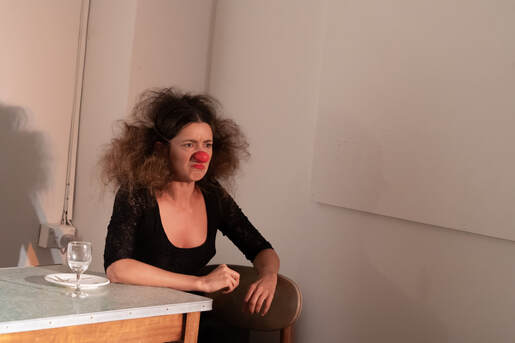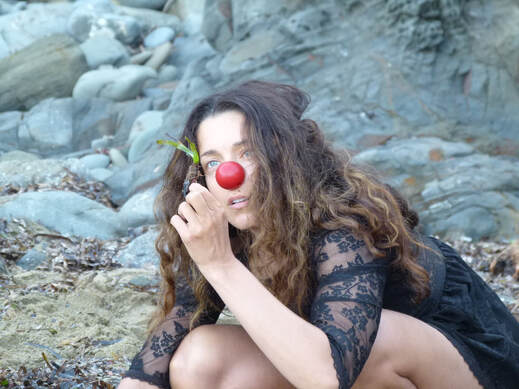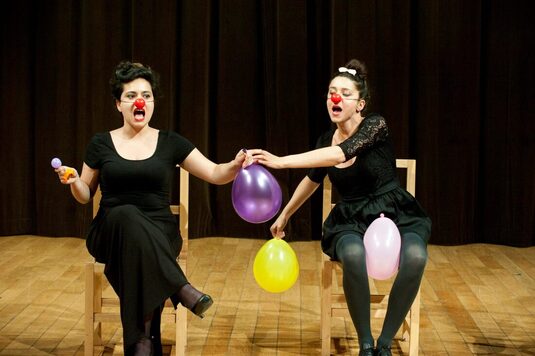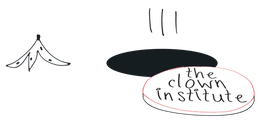|
Clowning is in the heart business, not only does it help heighten our immune system it can also make the heart stronger, plus the clown can touch our hearts too. A clown is to be your heart on stage, whether that be the stage of life or a theatre. Sometimes we go through experiences that feel too large or significant for words to fully capture, and that is where art, our hearts, and clowning becomes useful; we go to humour, symbols, and imagery to tell our stories. Isn't that wonderful? When I first set out to put together the Clown & Melodrama workshop back in late 2019, it was born out of curiosity and desire to express my despair and to find a playful way to transform that heartbreak into physical comedy. My questions were: what's the most fun way to create clown performances from these identifiable life moments and personal struggles, and secondly could these clown performances inspire laughter, hope, and healing in others?
In devising the workshop, I decided to review my time as a student at the Jacques Lecoq school, combining principles (or provocations) from subjects we learned like melodrama, tragic chorus, and clown. I wanted to understand how best to take an audience on a pathos-fuelled journey, via tears and laughter. I remembered the work we did in the first year exploring music and the counter mask where we moved the opposite way, or against the rhythm of a musical composition. As students writhing around to the music, we'd find an absurdity – a kind of sense in the nonsense. So, I mused why not apply this similar counter mask idea to create a clown logic that reverses the audience's expectations and that could potentially tug at the heart too. I found that we can take a very serious subject like the separation of a couple and observe how the clown subverts this situation by playing against it, by using an opposite expected rhythm. The improvisation plays out like this: The clown arrives home from a long day of work and hustling to find their spouse (played by an actor in realism) furiously packing and stuffing their personal belongings into a suitcase. The most obvious reaction is for the clown to play sadness or rage. This would be the boring choice and as the audience yes, we'd feel pity for the clown but would we be transformed, is this going to tickle our funny bone and make us love the clown? My guess is - not really. But what if the clown were to walk in, pause and observe their spouse packing, suddenly change their rhythm by excitedly grabbing their dusty suitcase, snorkel gear, and beach towel under the notion that they were together going on a romantic getaway. To add insult to injury, we then hear a knock at the door and the clown's spouse greets a stranger with a passionate embrace and kiss. The clown, stunned and wide-eyed now chooses an unexpected rhythm hurriedly walks up to the stranger shakes their hand, and offers them a generous tip, mistakenly believing the new lover is the cab driver that will drive them to the airport. It is 200% more fun and surprising for the clown, your scene partner, and the audience when we get to play against the obvious and alternate the expected rhythms. Here we can access vulnerable states, paradoxes, and reversal of order which benefits the clown enter into a playful tragic realm. It removes all sentimentality so it is the audience who does the work of feeling (the gooey heart stuff) and this can hopefully lead to transformation. What is the transformation? In this scenario it is about us, the audience, connecting to the fool's misunderstanding. Around the world, we're all fractured and socially disconnected. In clowning and clown training we can engage laughter and play in direct action towards social justice, to alleviate pain and suffering, and to remind us of our humanity. The clown's role in theatre or social contexts has become clearer to me over time; they're the guiding light of hope. They're the eternal dreamer showing us the way that with every human disaster there's an opportunity to create a space for connection, to experience empathy. The Clown and Melodrama workshop aims to access a playful dimension to our human tragedies. Day one of the workshop is focused on the journey of the emotions and opening the clown's heart first because before we can begin to perform 'heart surgery' on others to some degree we must be prepared to access our vulnerable states and stories first. Day two of the workshop is then dedicated to improvisation and games around how the clown can stay optimistic despite a terrible situation, as well as devising clown creations. It's easy to be playful and laugh when we are feeling good, but it is when the world seems bleak that we need to laugh the most in our lives. Our laughter then echoes in the chambers of our hearts, filling the empty spaces with pure joy and fun. Books
FilmsTVVideosSchoolsOrganisations
"There are three masks: the one we think we are, the one we really are, and the one we have in common." — Jacques Lecoq
The pedagogy of Jacques Lecoq has been the most influential and inspiring source for my teaching practice. As actors and creators, our goal is to develop a language that can evoke emotions, provoke thoughts, and create performances that truly touch people. This language should be both articulate and poetic, enabling us to express concepts that are imaginatively extraordinary. Surprisingly, some of these concepts may not initially seem dramatic, theatrical, or hilarious because they are often present in our everyday lives, and we have grown accustomed to them. For instance, the poetry lies in observing the people in a waiting room or the actions that make up our morning or nighttime rituals. It's about recognizing the ideas surrounding space, rhythm, and time. The core principle of Lecoq's pedagogy is to start by opening our eyes and truly observing. When Lecoq referred to the poetic, he meant those aspects of life that cannot be easily defined, that surpass words, and yet bring us together in a profound way. Once upon a time, humanity lived in close connection with nature and its phenomena. Some of these phenomena were awe-inspiring and even terrifying, such as earthquakes, fires, and plagues. To cope with these intense fears, humanity turned to adoration and the sacred. They believed that everything on Earth possessed a soul, whether it be rocks, trees, or animals. There was a desire to physically represent and communicate with the divine and the incomprehensible. This need to make the invisible visible and share it with a community and an audience led to the embodiment of these representations using materials like clay, wood, and rock. Ultimately, they used their own bodies to bring forth the divine. In this context, the Lecoq pedagogy takes us from observing the world to observing the impact we have on the world. This is where the clown enters the stage. Clowns are like empty vessels waiting to be filled and seen. They absorb the world around them and, by embracing life, they become charged and overflowing. Clowns have a deep desire to imitate life, not in a mocking way, but with genuine curiosity and joy. For instance, they might observe a priest giving a sermon and think, "Oh! That looks like fun! I can do that too!" Observation is fundamental in clowning. Just take a moment to watch some of Jacques Tati's films (which I eventually did after much persuasion from our teachers in Paris). They are incredibly funny and remarkably precise. Try it yourself—practice observing and finding amusement in the simplest and most ordinary things and people. What catches your curiosity? Study how a pigeon walks, and you'll be amazed at the discoveries. But what does it truly mean to observe something? As performers and creators, it is liberating when we realize the power of observation as a tool. We unconsciously observe things all day, every day, but when we become conscious of our observations, we learn the value of letting go of preconceived judgments, personal stories, and attachments. We can then purely observe the physical poetry inherent in something. My main question throughout this research is whether clowns can create a logical sequence by observing and imitating a phenomenon. Where might this playful approach take us? What stories, gestures, emotions, and relationships would emerge for an audience or within a duo or trio? There are moments in life when words fall short, and we turn to symbols and imagery to convey our stories. We use gestures, sounds, or colors to create "le jeu"—play. During a clowning and body workshop I conducted last year, we explored this clownlogic, and a participant exemplified its essence beautifully. They were asked to observe something from the outside world and then convey their findings through improvisation. Initially, the student represented a caricature or a character with their own opinions. However, when I encouraged them to delve deeper and search for the truth, their physical portrayal evoked laughter from the other participants. They had observed a person driving a car and, in their truthful portrayal, we all recognized the universal moment of boredom and waiting that we experience ourselves. The shared laughter affirmed the power of authenticity in connecting with an audience. Another participant observed a puddle on a rainy day. At first, they tried to convey the puddle's narrative with their own reflections layered into it. However, when they simply became the puddle and searched for its truthful essence, a poetic tragedy unfolded before our eyes. We all experienced a profound reaction to this glimpse of our own reflection. It was far more satisfying for the audience when the actor allowed room for us to breathe, dream, and imagine. Who would have thought a clown could be a puddle? It was both beautiful and tragic when someone stepped into it. Furthermore, we explored finding the voice of the clown. One participant observed a pigeon and, in organizing their body accordingly, they discovered a truthful dynamic. As the organs shifted inside, their voice changed, and their gaze transformed. We witnessed a touch of madness, a "follie," that could potentially become the starting point for a clown persona. Lastly, a student observed an umbrella. They focused on the specific qualities such as color and material, distinguishing between plastic and steel. They found the essence of the closed umbrella and then, with a pop, opened themselves up. In that precise moment, they uttered the phrase "that's a bit rough." It provoked laughter, showcasing the power of embodying the physicality first. When we work diligently with our bodies, the necessary text naturally emerges. This exploration is about play and imagination, envisioning and embodying the circumstances in a universally poetic sense. It doesn't require delving into psychological headspaces or relying on emotional recall from past painful memories. It remains grounded in the truth—the dynamic quality of a phenomenon. Transposing or playing with the truth can be far more satisfying than relying on ideas, parody, or personal memories. This has been my experience, and it was evident in the reactions of the audience as well. Regardless of where we find ourselves in the world, I hope that through this playful transposition of dynamics in the body, I can witness the emergence of clowns and unique poetic worlds filled with both hope and disaster. This is one of my all time fave quotes and moments in a film. It sums up for me the profound sentiment I have following a clown workshop; it’s a feeling of stupefaction and awe at each person’s capacity to share something usefool with the world. The Fool: I am ignorant, but I read books. You won't believe it, everything is useful... this pebble for instance. Gelsomina: Which one? The Fool: Anyone. It is useful. Gelsomina: What for? The Fool: For... I don't know. If I knew I'd be the Almighty, who knows all. When you are born and when you die... Who knows? I don't know for what this pebble is useful but it must be useful. For if its useless, everything is useless. So are the stars! - Excerpt from La Strada As I get ready to run a morning weekend clown workshop I watch new students roll in donning their adulthood overcoats. When they arrive some hang back politely happy to make small talk sharing timid smiles, there’s the slightly perplexed face of ‘somebody who doesn’t know’, and others who are excited raring to go.
One of my greatest pleasures is observing the loosening of the presentable and acceptable version of adulthood into disarming playfulness within minutes as we engage in one of our first games called ‘Soul Train’. Music is a fabulous motivator; I’ve seen some jaw-dropping situations. There are particular songs that transform us even if it is for just a moment – they can make us strong, brave, sexy, completely savage, etc… and the best part is that it’s totally okay if that’s what we think we’re being at the time! We play these types of games not to prepare you for an audition on The Voice or to demo what an accomplished professional dancer or singer you are, rather it’s to discover something about yourself and ultimately about your clown. It’s a real joy to watch a person’s willingness to crack open their bodies, voices and hearts and trumpet their unabashed creativity alongside a bunch of strangers elevating their stupidity to the next level. It’s a reciprocal ride of generosity and tuning in to one another, what French acting instructor Jacques Lecoq coined during his pedagogic journey as ‘complicité’. There is a shared understanding and a real sense of connectedness in the room; everyone’s rooting for you and there’s a desire for one to succeed. Let’s face it adulting can be pretty combative and pressurizing sometimes; ‘get a job’, ‘stand up straight’, ‘eat with your mouth closed’, ‘love me!’ and so on, and clowning is one way to flip that on its head. It’s like a huge empathetic boost inviting us all to unleash our fun on and anarchic ways. A shared laugh is a shared feeling after all. It is the end of the morning weekend workshop, as people say their goodbyes and thank yous it’s plain easy to see that some of us are reluctant to take our adulthood overcoats back home. I’ve realized I teach others in order to learn myself. It is tricky to identify as a teacher, in fact, I am simply there to guide and shine the light in the direction where your clown wants to go. It’s a process of mutual discovery and I’m very fortunate because it is one of the finest ways to learn about the human condition, which I find usefool. I don’t know for what but it must be useful. Be honest. Be Stupid. Be interested. Play. Be vulnerable. Play. Play. Play. My first introduction to clown and physical comedy was in New York with Virginia Scott. But it wasn’t until later on during my second year in Paris studying at Jacques Lecoq that I experienced the fundamental joy and benefits of this ancient playful art. At the heart of the Jacques Lecoq pedagogy is Le Jeu, which is Play. I personally and artistically struggled with this principle for a long time. I resisted playing and in fact I’d forgotten how to play.
I remember we were coming to the end of our two years at school and I was dreading the idea of clowning. I thought ‘why on Earth would I need to learn to be ridiculous and put on a red nose? I am a serious actor, this does not apply to me!’. If truth be known my body sensed my own bulls**t; it was way smarter than my pea brain. It was as if my body instinctively perceived my ‘oh no here it comes, they are all going to finally see me’. Exposed, raw, vulnerable, the scared little Alicia wanted to run away, back to Sydney, fast. But there was no use kicking and flailing because my body wanted to stay and play. Luckily it did. It took some muscle work, a trickle of tears and a torrent of laughter but soon enough I was parading my dreams, fears and fantasies on stage donning the red nose for my class to laugh with, or not. I was starting to get it; in the mindset of the clown I was finally playing. Once I left school I began to understand how useful play and clowning is for me as a performer and as a person. Few people really know how to play and allow themselves the freedom to be ridiculous. Perhaps this is why I now love facilitating and running workshops in clowning, so I can inspire students to celebrate their ridiculousness and rediscover their sense of play. In class I have great responsibility to stay present, engaged and playful too. The beauty of teaching clown is that I am also asked to remain playful at all times, making cheeky observations, asking provocative questions and setting challenging tasks for each clown student, all in the name of fun! What if we approached our lives, our relationships and our work with that sense of play, awe and child-like wonder? Walking into every situation would be tremendously joyful. We’d be amazed, take notice and be grateful for the most beautiful and banal things around us. We’d learn more and be forever refreshed as we look at life from the eyes of a four year old, giving in to the innocence inside you. |
AuthorAlicia Gonzalez is a clown and coach living the beautifool life. Archives
July 2024
Categories
All
|



 RSS Feed
RSS Feed
